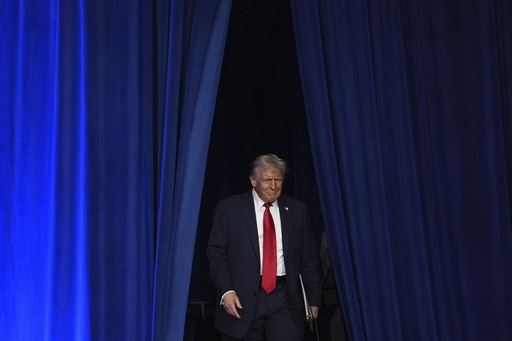Global initiatives aimed at tackling climate change faced significant setbacks during Donald Trump’s previous presidency, particularly when he withdrew the United States from an essential international climate agreement. In the absence of U.S. leadership, various countries, states, cities, and businesses attempted to fill the void left by the withdrawal.
Experts are increasingly apprehensive that a second term for Trump could have even more dire consequences, potentially pushing the U.S. further away from global climate initiatives and complicating the efforts of future administrations. With Trump, who has publicly dismissed the realities of climate change, leading the world’s foremost economy, concerns are mounting that other nations—especially major polluters like China—might relax their own ambitious plans to reduce carbon emissions.
Rob Jackson, a climate scientist at Stanford University and chair of the Global Carbon Project, expressed grave concerns about the international community’s ability to limit global warming to the critical threshold of 1.5 degrees Celsius since pre-industrial times. He noted that the world is dangerously close to surpassing this limit, amid rapidly rising carbon dioxide emissions worldwide. While some optimists still believe the goal can be achieved, Jackson’s outlook remains grim.
The potential for Trump’s reelection coincides with alarming climatic events globally, as the planet appears set for another record-breaking hot year, with communities grappling with extreme droughts, floods, wildfires, and hurricanes. Laurence Tubiana, CEO of the European Climate Foundation, warned in August that a reinvigorated Trump administration would pose a significant threat to climate progress.
Following the election, Tubiana, who played a crucial role in developing the 2015 Paris Agreement abandoned by Trump, described the election outcome as a setback in the fight against climate change. However, she highlighted that the Paris Agreement remains robust and capable of resisting the impact of any single country’s policy decisions.
Next week, climate negotiators will convene in Baku, Azerbaijan, for the annual UN climate talks under the Paris Agreement. Following this event, all countries, including the U.S., are expected to submit national plans detailing enhanced actions aimed at reducing greenhouse gas emissions from fossil fuels.
Li Shuo, Director of the Asia Society Policy Institute, emphasized that the Baku meeting will serve as an early test of the overall resilience of the global climate framework, predicting that the European Union and China would likely step up to provide leadership in the absence of U.S. guidance. Notably, when Trump announced the U.S. exit from the Paris Agreement in 2017, not a single country followed suit, which led to the emergence of the We Are Still In movement, rallying states, businesses, and local leaders committed to combating climate change.
Experts like Alden Meyer cautioned that the consequences of a potential new withdrawal could extend beyond the Paris Agreement, potentially leading to the U.S. exiting its foundational commitments made in the 1992 Rio conventions, which laid the groundwork for ongoing climate efforts through the United Nations.
The framework governing climate change negotiations was established by President George H.W. Bush in 1992, leading to subsequent agreements like Kyoto and Paris. While the original Rio agreement was accepted by the Senate, the Kyoto Protocol faced strong opposition and was ultimately dismissed by President George W. Bush. The Paris Agreement, crafted to be voluntary, allowed President Joe Biden to rejoin without requiring Senate approval in 2021.
Meyer indicated that if the U.S. were to withdraw from the Rio treaties and the underlying UN Framework Convention on Climate Change, it could severely impair future participation in global climate discussions. David Waskow from the World Resources Institute concurred, asserting that such a withdrawal would effectively remove the U.S. from significant international climate dialogues.
As per the Paris Agreement, nations are required to submit updated and more ambitious plans to cut greenhouse gas emissions every five years, with the next deadline set for February. While the Biden administration is poised to meet this commitment, many believe that a Trump administration may not uphold it.
Meyer likened the erratic U.S. approach to climate agreements under different administrations to a recurring gag from the Peanut’s cartoon, suggesting that the international community is growing weary of this inconsistency in U.S. policy.
Joanna Depledge, an expert in international climate negotiations, predicted that a second term for Trump could result in significant delays in U.S. climate action. Nevertheless, she noted that the global community has evolved a degree of resilience in response to U.S. unpredictability and will likely remain steadfast in its own climate commitments.
Despite the setbacks during Trump’s first presidency, many advocates remain hopeful, underscoring that meaningful action continues in various parts of the world. Former U.N. climate chief Christiana Figueres pointed out that actions on the ground demonstrate a commitment to addressing climate challenges, highlighting that hope remains alive amid discouraging circumstances.
The upcoming climate discussions will be crucial, particularly for addressing the financial assistance that poorer nations require to combat the impacts of climate change. Nevertheless, skepticism persists regarding the U.S. commitment to fulfilling any agreements made in these negotiations.
Traditionally, U.S.-China cooperation has sparked broader global climate commitments, but with a leadership vacuum anticipated under a Trump administration, analysts predict that China’s approach may shift accordingly, dampening the momentum seen in previous years.
Nevertheless, many within the climate negotiation community continue to foster a spirit of optimism. As Figueres noted, proactive measures are being implemented worldwide, providing a counterbalance to feelings of despair regarding climate change.
